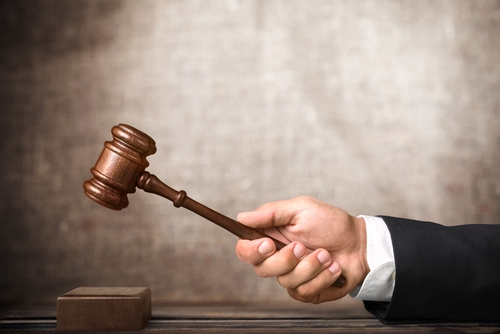Federal judge who said he would 'crush' plaintiff's case prejudged her bias claims, 5th Circuit says

Image from Shutterstock.com.
A federal appeals court has revived a plaintiff’s bias claim and removed U.S. District Judge Lynn Hughes of the Southern District of Texas from her case, citing remarks and actions indicating that he had prejudged the case.
The 5th U.S. Circuit Court of Appeals at New Orleans ruled Friday for psychology professor Audrey Miller.
Bloomberg Law, Law360, the Houston Chronicle and Reuters have coverage.
Judge Cory Wilson wrote the consolidated opinion.
“From the outset of these suits, the district judge’s actions evinced a prejudgment of Miller’s claims,” Wilson wrote.
The problems for Miller began at an initial case management conference. At one point, Hughes said he would “crush” the case. “And things went downhill from there,” Wilson wrote.
Hughes limited Miller’s discovery, tossed some of her claims sua sponte, and chastised her when he participated in a deposition, Wilson said.
Miller had sued the Sam Houston State University after it denied her tenure and the University of Houston Downtown when it refused to hire her. Miller sued the universities and the university systems in two separate lawsuits.
Miller had alleged sex discrimination, retaliation and a hostile work environment. She said the Sam Houston State University gave her a disproportionately heavy workload, and disagreements with faculty members were retaliatory. The university countered that Miller was “lacking in collaborative and attentive generosity towards her colleagues.”
Miller applied for an open faculty position at the University of Houston Downtown. She did not get an offer after the university contacted the Sam Houston State University. The position went to someone who had scored lower than Miller on the University of Houston Downtown’s hiring metrics.
At the initial case management conference, Hughes complained that there were four defendants instead of two.
“You sued the system[s] and the institution[s],” Hughes told the lawyer for Miller. “So, pick any two you want. I don’t care.”
The lawyer chose to keep the university defendants.
“We’ll dismiss the systems,” Hughes said. “Systems don’t do anything. They hire large staffs and go around and make life difficult for the actual institutions themselves. It’s in their charter; annoy their workers.”
As the conference continued, Hughes “made several other off-key remarks,” the appeals court said. Hughes remarked, “There is nothing that [Miller] didn’t complain about. Anything anybody did for two and a half years, three years, was all for some ulterior motive.” He also said, “I have had more tenure decisions than you can imagine working here. You wouldn’t think professors were litigious, but apparently they are.”
When Miller sought additional discovery, Hughes refused, saying the request was “too argumentative” and extensive.
When Miller’s lawyer opposed Hughes’ suggestion to consolidate the lawsuits, Hughes replied: “All right. I will get credit for closing two cases when I crush you.”
Hughes denied Miller’s motion for reconsideration and denied repeated discovery requests by Miller. Finally, Hughes allowed Miller’s lawyer to depose a dean but limited the session to no more than two hours.
During the universities’ deposition, Hughes attended and participated in parts of the universities’ deposition.
At one point, Hughes admonished Miller, saying: “If you’re unhappy with the rulings I’ve made about discovery, that’s fine. Free country. This is not a place to discuss your feelings. It’s a place to answer [opposing counsel’s] questions. You have sued his client—their—their clients’ people, and they have a right to know exactly why.”
At another point, Hughes interjected, “Ma’am, you’re not to lecture the state of Texas on the law. [Your counsel] and I will do that. It is not important to your case what you think about what nine old people on the Potomac River talk about something. We’re here to find out what you actually know … about the facts. So, please, do not burden the record with side trips.”
After the deposition, Hughes asked the universities’ counsel whether they were going to move for summary judgment, “clearly implying that they should,” the appeals court said.
Ultimately, Hughes granted summary judgment to the universities in September 2019.
Wilson said Hughes had imposed similar discovery restrictions in a different case, leading the appeals court to conclude in 2017 that he had abused his discretion.
“We have a sense of déjá vu,” Wilson wrote. “To put it simply, the court’s discovery restrictions suffocated any chance for Miller fairly to present her claims.”
It’s not the first time that the 5th Circuit has booted Hughes off a case. In 2018, the appeals court removed Hughes from a case because of remarks that appeared to be about a female prosecutor. Hughes had dismissed the case because of discovery mistakes by the prosecutor.
“It was lot simpler when you guys wore dark suits, white shirts and navy ties,” Hughes had said. “We didn’t let girls do it in the old days.”
The appeals court also criticized Hughes in January 2013 for a remark about former President Barack Obama and fried chicken but upheld his dismissal of a bias case.
The bias plaintiff had complained about a facilities manager’s alleged remark that if Obama is elected, “They’re going to have to take the [Statue] of Liberty and put a piece of fried chicken in [its] hand.”
Hughes had said the alleged remark was political.
“No Black individually and no Blacks collectively owns the sensitivity rights to fried chicken or anything else,” he said.
The 5th Circuit also refused to order Hughes’ recusal in September 2013, when he allegedly said at a pretrial hearing that people of Indian descent are Caucasian, and “Eleanor Roosevelt said staffs of one color always work better.”
He also commented on the origins of the swastika.
Hughes was also in the news in 2016 when he issued an “order on ineptitude” to express his displeasure with Department of Justice prosecutors.



